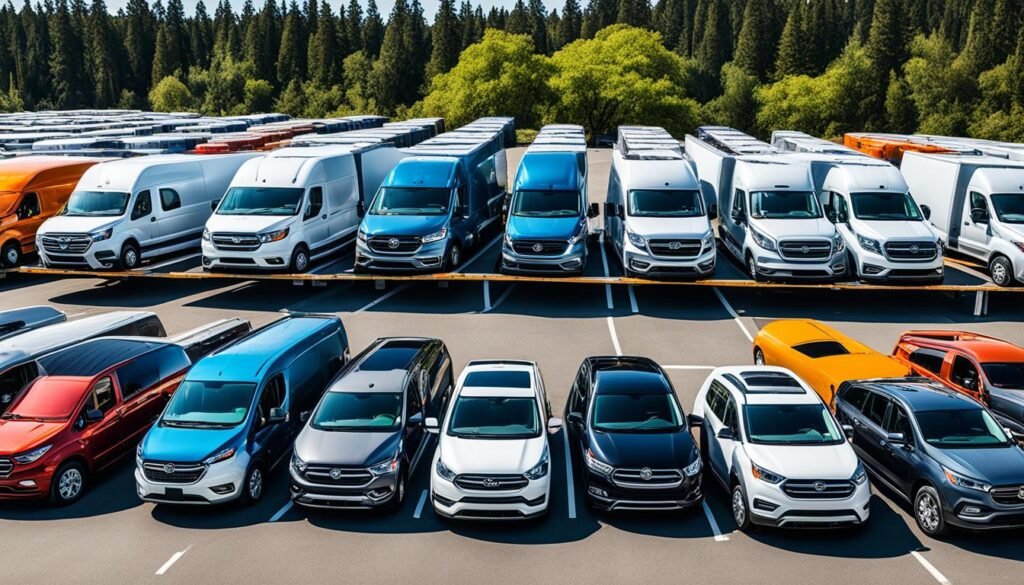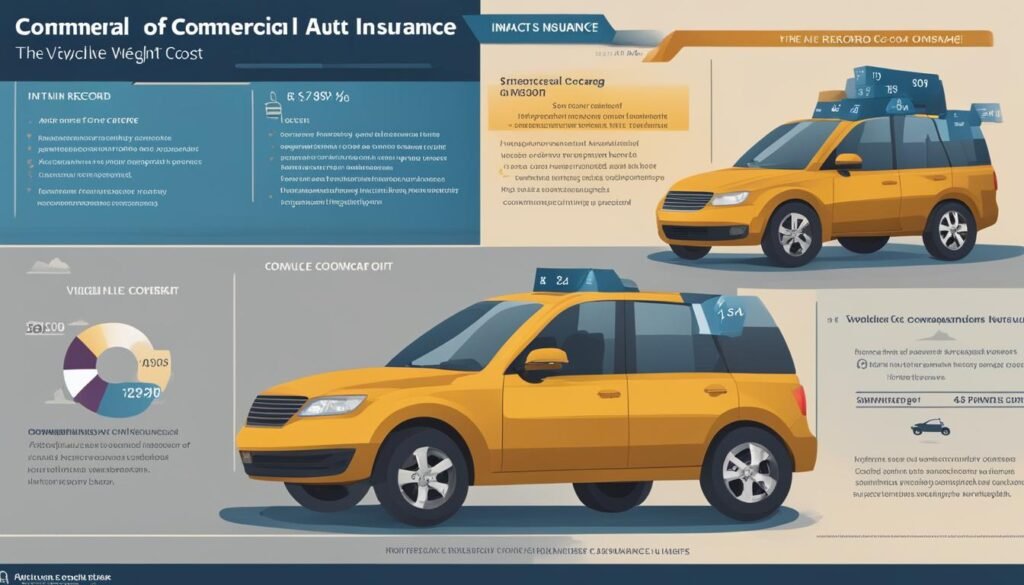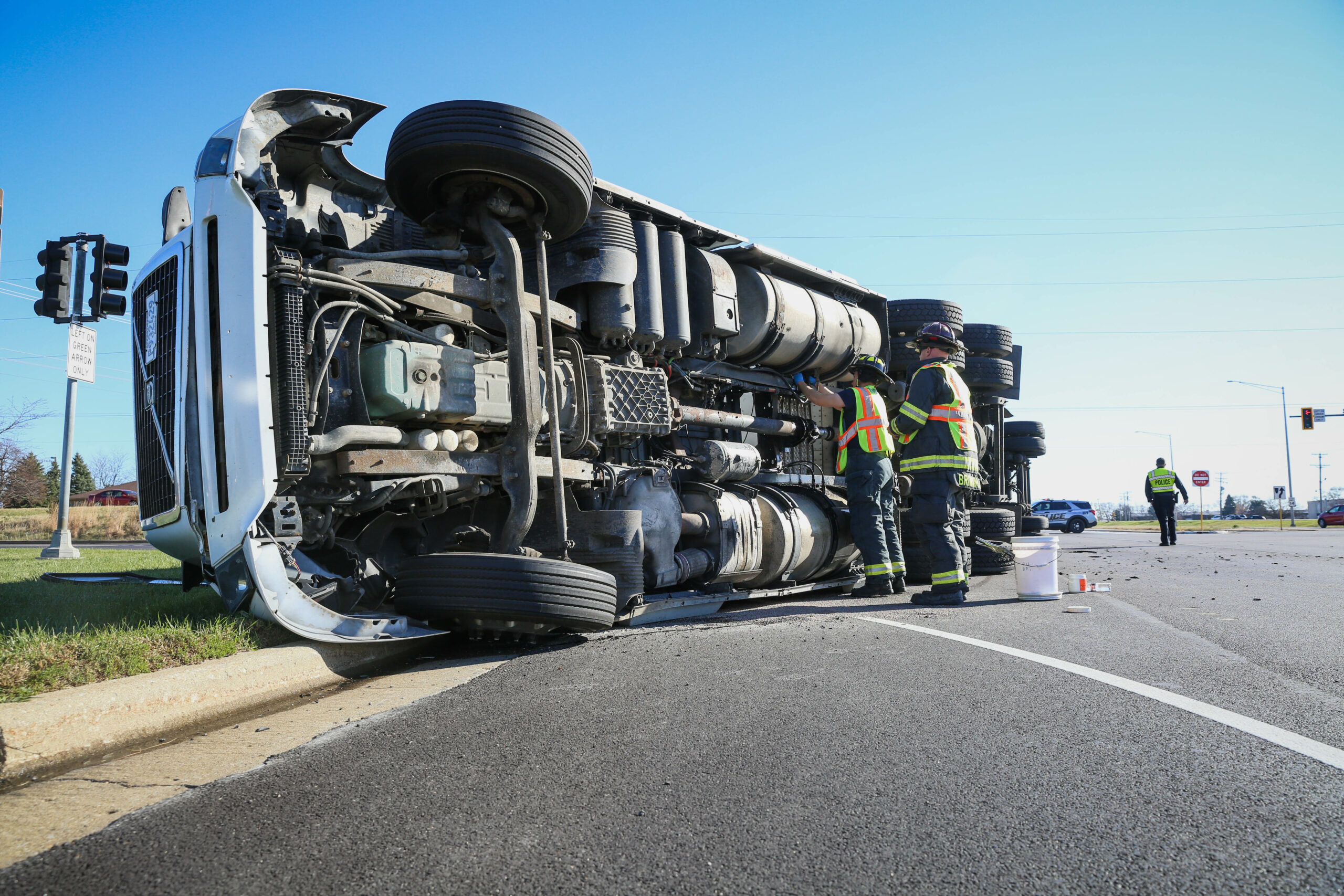Are you searching for cheap commercial auto insurance that fits your budget? Look no further! In this article, we will explore how you can find affordable commercial auto insurance deals to protect your business vehicles and ensure peace of mind.
Commercial auto insurance is essential for businesses that rely on vehicles for their operations. Whether you own cars, vans, trucks, or food trucks, having the right insurance coverage can protect you from accidents and potential financial losses.
At GEICO, we understand the importance of affordable commercial auto insurance. That’s why we offer specialized coverage tailored to suit the needs of different businesses at competitive prices. Our online quote system allows you to easily customize your policy based on your specific requirements.
Don’t let the fear of high insurance costs hold you back from protecting your business assets. With our affordable commercial auto insurance deals, you can drive with confidence and focus on what matters most – running your business.
Key Takeaways:
- Commercial auto insurance provides coverage for vehicles used for business purposes.
- GEICO offers affordable commercial auto insurance deals tailored to suit different businesses.
- Having commercial auto insurance is crucial for protecting against accidents and potential financial losses.
- Comparing quotes and customizing your policy can help you find budget-friendly coverage.
- Don’t compromise on insurance coverage – choose affordable commercial auto insurance to safeguard your business.
What Does Commercial Auto Insurance Cover?
Commercial auto insurance provides comprehensive coverage for various aspects of business vehicles. With the right insurance policy in place, businesses can protect themselves financially in the event of accidents, damages, or injuries. Let’s take a closer look at the different types of coverage offered by commercial auto insurance:
1. Liability Coverage
Liability coverage is a crucial component of commercial auto insurance. It provides protection against damages and injuries caused to others in an accident where the insured business is at fault. This coverage helps cover medical expenses, property damage, legal fees, and other associated costs.
2. Collision Coverage
Collision coverage is designed to cover the cost of repairing or replacing the insured vehicle in the event of a collision, regardless of fault. It ensures that the business can recover from significant damage without incurring substantial out-of-pocket expenses.
3. Comprehensive Coverage
Comprehensive coverage protects against non-collision events that could cause damage to the insured vehicle. This includes incidents such as theft, vandalism, fire, natural disasters, and falling objects. With comprehensive coverage, businesses can have peace of mind knowing they are protected against various risks.
4. Uninsured Motorist Coverage
Uninsured motorist coverage provides protection if the insured vehicle is involved in an accident with an uninsured or underinsured driver. It helps cover medical expenses, property damage, and other costs when the at-fault party does not have sufficient insurance coverage.
By having these different types of coverage, businesses can mitigate potential financial risks associated with accidents or damage to their vehicles. It is essential to review the specific policy terms and conditions to understand the extent of coverage offered.
“Commercial auto insurance provides comprehensive coverage for various aspects of business vehicles.”
Factors That Affect Commercial Auto Insurance Costs

Several factors can impact the cost of commercial auto insurance. It’s essential for businesses to understand these factors to make informed decisions about their insurance coverage. The following are key factors that insurance companies consider when determining the cost of commercial auto insurance:
Industry and Profession
The industry and profession of the business play a significant role in determining insurance costs. Different industries have different risks associated with driving. For example, delivery drivers may face a higher risk of accidents compared to office-based professionals.
Location
Location is another important factor in commercial auto insurance costs. Urban areas and locations with a high claims history generally have higher premiums. Areas prone to severe weather conditions or higher levels of traffic congestion also tend to have higher insurance costs.
Vehicles
The type of vehicles used by the business can impact insurance costs. Factors such as the make, model, age, and value of the vehicles are taken into consideration. Certain vehicles may have higher premiums due to increased repair costs or a higher likelihood of theft.
Driving History
The driving history of the insured individuals, including any previous accidents or traffic violations, can affect commercial auto insurance costs. Insurance companies typically consider the driving records of all employees who will be driving the insured vehicles.
Coverage Needs
The coverage needs of the business also influence insurance costs. This includes factors such as desired coverage limits and deductibles. Higher coverage limits and lower deductibles generally result in higher premiums. Businesses should carefully assess their coverage needs to strike a balance between adequate protection and cost-effectiveness.
By understanding these factors, businesses can make informed decisions when selecting commercial auto insurance coverage. Taking steps to mitigate risks and manage insurance costs can help businesses find the most cost-effective solutions for their unique needs.
How to Get Cheap Commercial Auto Insurance
Obtaining affordable commercial auto insurance is essential for businesses looking to protect their vehicles and finances. Here are some effective strategies to get cheap commercial auto insurance:
- Maintain a clean driving record: Demonstrating safe driving habits by avoiding accidents and traffic violations can help lower insurance premiums. Insurance providers often reward businesses with a clean driving record with lower rates.
- Adjust coverage limits and deductibles: By adjusting coverage limits and increasing deductibles, businesses can effectively reduce insurance costs. Higher deductibles mean paying more out-of-pocket in the event of a claim, which can result in lower premiums.
- Take advantage of discounts: Insurance providers offer various discounts that businesses can leverage to lower their commercial auto insurance costs. Some common discounts include:
| Discount Type | Description |
|---|---|
| Prior auto insurance discounts | Businesses that have had continuous auto insurance coverage can qualify for discounts. |
| Package policy discounts | Insuring multiple vehicles or combining multiple policies, such as commercial auto and general liability insurance, can lead to discounted rates. |
| Commercial driver’s license discounts | Employing drivers with a commercial driver’s license can result in lower insurance premiums. |
By implementing these strategies, businesses can effectively reduce their commercial auto insurance costs while still ensuring adequate coverage for their vehicles and drivers.
What Determines the Cost of Commercial Auto Insurance?

The cost of commercial auto insurance depends on several key factors that insurers consider when determining premiums. These factors include:
- Type of Work: The nature of the business and the industry it operates in can impact insurance costs. Industries with higher risks associated with driving, such as transportation or construction, often have higher premiums due to increased chances of accidents or claims.
- Number of Vehicles: The number of vehicles owned by the business is another important factor. Generally, the more vehicles a business has, the higher the premiums will be due to the increased exposure to accidents and potential claims.
- Location: The location where the business operates plays a role in determining insurance costs. Areas with higher crime rates or higher instances of natural disasters can result in higher premiums due to the increased risk of vehicle damage or theft.
- Claims History: The claims history of the business also affects the cost of commercial auto insurance. Businesses with a history of frequent claims may be seen as higher risk, leading to higher premiums.
- Coverage Limits: Finally, the coverage limits selected by the business impact the cost of insurance. Higher coverage limits typically result in higher premiums, as they provide greater financial protection in the event of an accident or claim.
By considering these factors, insurers can assess the level of risk associated with insuring a business’s vehicles and calculate an appropriate premium amount.
| Factors | Impact on Cost |
|---|---|
| Type of Work | Higher-risk industries result in higher premiums. |
| Number of Vehicles | More vehicles lead to higher premiums. |
| Location | Areas prone to crime or natural disasters may have higher premiums. |
| Claims History | Frequent claims can result in increased premiums. |
| Coverage Limits | Higher coverage limits generally correspond to higher premiums. |
Average Cost of Commercial Auto Insurance
The average cost of commercial auto insurance can vary significantly based on several factors. According to data from NEXT, a leading insurance provider, 43% of customers pay less than $150 per month for their commercial auto insurance policies. However, the specific cost depends on various elements specific to each business.
One important factor that influences the cost of commercial auto insurance is the type of work a business engages in. Industries with higher risks associated with driving, such as construction or delivery services, may have higher premiums compared to lower-risk industries like consulting or accounting.
The number of vehicles a business owns is another key consideration. Insuring a larger fleet of vehicles generally leads to higher premiums. Additionally, the state in which the business operates plays a role in determining insurance costs. Different states have varying levels of insurance regulations and claims history, leading to differences in premium rates.
The claims history of a business is also factored into the cost of commercial auto insurance. A history of frequent claims or accidents can result in higher premiums since insurers perceive a higher risk. Conversely, businesses with a clean claims record may enjoy lower rates.
Another aspect that affects insurance costs is the policy limits chosen. Higher policy limits provide more extensive coverage but typically come with higher premiums. It’s important for businesses to carefully evaluate their coverage needs and strike a balance between adequate protection and manageable costs.
To provide an overview of the median monthly premiums for different professions, here are some examples:
- Consultants: Under $75
- Food truck owners: $100 to $150
- General contractors: $150 to $200
- Delivery drivers: $200 and above
Sample Table: Median Monthly Premiums by Profession
| Profession | Median Monthly Premium |
|---|---|
| Consultants | Under $75 |
| Food Truck Owners | $100 – $150 |
| General Contractors | $150 – $200 |
| Delivery Drivers | $200 and above |
Remember, these figures are only median estimates and can vary based on numerous factors. By understanding the factors that influence commercial auto insurance costs and considering options that suit their specific needs, businesses can make informed decisions when choosing policies with appropriate coverage and reasonable premiums.
How to Reduce Commercial Auto Insurance Costs
Businesses can take several steps to effectively reduce their commercial auto insurance costs. By implementing the following strategies, businesses can minimize their risk, optimize their coverage, and potentially save money on their insurance premiums.
Minimize Risk
To lower insurance costs, it’s essential for businesses to minimize risk and demonstrate their commitment to safe driving practices. Some effective methods include:
- Ensuring Reliable Vehicles: Regularly inspecting and maintaining vehicles can help prevent accidents and reduce the likelihood of costly repairs.
- Provide Driving Training to Employees: Offering training programs that promote safe driving habits and defensive driving techniques can lower accident rates.
- Conduct Regular Inspections: Regular inspections help identify potential issues or maintenance requirements before they develop into major problems.
Implementing these risk management practices not only reduces the chance of accidents but also helps businesses demonstrate their commitment to safety to insurance providers.
Analyze Previous Claims
Analyzing previous insurance claims can provide valuable insights into areas where improvements can be made to avoid future risks. Identifying patterns or common causes of accidents can help businesses develop targeted strategies to mitigate these risks.
By analyzing previous claims, businesses can implement changes, such as additional training or stricter safety protocols, to reduce the likelihood of similar incidents in the future and potentially reduce insurance costs.
Choose Appropriate Coverage Limits and Deductibles
Choosing the appropriate coverage limits and deductible amounts is essential when customizing a commercial auto insurance policy. It’s important to strike a balance between having sufficient coverage and avoiding unnecessary expenses.
| Coverage Limits | Deductibles | Impact on Premiums |
|---|---|---|
| Higher Limits | Lower Deductibles | Increase premiums but provide broader coverage and lower out-of-pocket expenses in the event of a claim |
| Lower Limits | Higher Deductibles | Reduce premiums but limit coverage and increase out-of-pocket expenses in the event of a claim |
Businesses should assess their specific needs and evaluate the potential risks they face to choose coverage limits and deductibles that strike the right balance for their budget and protection requirements.
Bundle Policies
Bundling multiple insurance policies with the same insurer is a practical approach to reduce commercial auto insurance costs. Many insurance providers offer discounts for bundling policies, which can result in significant savings.
Bundling commercial auto insurance with other policies, such as general liability insurance or property insurance, can lead to lower overall costs while still providing comprehensive coverage.
Additionally, bundling policies simplifies management by consolidating multiple insurance policies under a single provider, streamlining administrative tasks and potentially saving time.
To summarize, businesses can reduce commercial auto insurance costs by minimizing risk through reliable vehicles, driving training, and inspections. Analyzing previous claims can inform targeted risk reduction strategies. Choosing appropriate coverage limits and deductibles strikes a balance between coverage and expenses. Lastly, bundling policies with the same insurer can lead to discounts and lower overall costs.
How Commercial Auto Insurance Premiums Are Calculated
Calculating commercial auto insurance premiums involves considering several factors that impact the overall cost of coverage. Insurance providers evaluate these factors to determine the appropriate level of risk and establish the premium that the insured business needs to pay.
Insurers take into account various factors when calculating commercial auto insurance premiums. These factors include:
- Vehicle make, model, and year: The type of vehicle being insured can influence the premium. Factors such as the vehicle’s safety record, repair costs, and susceptibility to theft or damage are considered.
- Coverage limits: The desired coverage limits play a role in determining premiums. Higher coverage limits typically result in higher premiums.
- Type of work: The industry or profession of the business can affect the premium. Industries with higher risks associated with driving may have higher premiums.
- Number of vehicles: The number of vehicles owned by the business is also a factor. Insuring more vehicles generally leads to higher premiums.
Once the relevant information is gathered, insurers use it to assess the level of risk associated with the business and its vehicles. The higher the perceived risk, the higher the premium is likely to be.
In conclusion, commercial auto insurance premiums are calculated based on factors such as the make, model, and year of the insured vehicle, the desired coverage limits, the type of work the business performs, and the number of vehicles owned. By understanding these factors, businesses can make informed decisions when purchasing commercial auto insurance and effectively manage their insurance costs.
Factors Considered in Commercial Auto Insurance Premium Calculation
| Factors | Description |
|---|---|
| Vehicle make, model, and year | The type of vehicle being insured, including its safety record, repair costs, and susceptibility to theft or damage. |
| Coverage limits | The desired level of coverage for property damage, liability, and bodily injury. |
| Type of work | The industry or profession of the business, including the risks associated with driving in that particular field. |
| Number of vehicles | The total number of vehicles owned by the business that require insurance coverage. |
Benefits of Obtaining Commercial Auto Insurance Coverage
Obtaining commercial auto insurance coverage offers several benefits to businesses. It provides financial protection against potential losses due to accidents or vehicle damage. In the event of an unfortunate incident, the insurance policy will cover the costs associated with repairs, medical expenses, and property damage, preventing businesses from facing significant financial burdens.
Furthermore, commercial auto insurance helps businesses ensure legal compliance with relevant regulations. Depending on the nature of their operations, businesses may be required by law to have auto insurance coverage. Failing to comply with these requirements can lead to fines and legal consequences. By obtaining commercial auto insurance, businesses can safeguard their operations and avoid potential legal issues.
Having the appropriate coverage in place gives business owners peace of mind. They can confidently conduct their day-to-day operations, knowing that they are protected in the event of an accident or vehicle damage. This peace of mind allows business owners to focus on their core activities, without worrying about the financial implications of unexpected incidents.
Commercial auto insurance not only provides financial protection to businesses but also extends coverage to employees who drive company vehicles. In the unfortunate event of an accident, employees are also safeguarded against potential medical expenses and damages. This coverage can boost employee morale and loyalty, as it demonstrates the company’s commitment to their well-being and security.
In summary, commercial auto insurance offers businesses financial protection, legal compliance, peace of mind, and coverage for both vehicle damage and employees. With the right insurance policy in place, businesses can navigate the challenges of the road with confidence and focus on their growth and success.
Conclusion
Affordable commercial auto insurance is an essential investment for businesses that rely on vehicles for their operations. Protecting your business assets and mitigating financial risks should be a top priority. By following a few simple steps, you can obtain budget-friendly coverage without compromising on quality.
Maintaining a clean driving record is one of the most effective ways to reduce insurance costs. Insurers often offer lower premiums to businesses with a history of safe driving. Additionally, adjusting your coverage limits and deductibles can help lower your monthly premiums.
Comparing quotes from different insurance providers and taking advantage of available discounts can further increase affordability. Many insurers offer discounts for factors such as good driving records, bundled policies, and commercial driver’s licenses.
Understanding the factors that influence commercial auto insurance costs is crucial. By managing these factors effectively, businesses can secure the coverage they need at a price that fits their budget. Don’t hesitate to protect your business and ensure peace of mind with affordable commercial auto insurance today.
FAQ
What does commercial auto insurance cover?
Commercial auto insurance covers vehicle damage and driver injuries for vehicles used for business purposes. It includes liability coverage, collision coverage, comprehensive coverage, and uninsured motorist coverage.
What factors affect commercial auto insurance costs?
The cost of commercial auto insurance is influenced by factors such as industry and profession, location, vehicles used, driving history, and coverage needs.
How can I get cheap commercial auto insurance?
You can get cheap commercial auto insurance by maintaining a clean driving record, adjusting coverage limits and deductibles, and taking advantage of discounts offered by insurance providers.
What determines the cost of commercial auto insurance?
The cost of commercial auto insurance is determined by factors such as the type of work, the number of vehicles, the location, the claims history, and the coverage limits selected.
What is the average cost of commercial auto insurance?
The average cost of commercial auto insurance varies depending on factors such as the type of work, the number of vehicles, the state where the business operates, and the claims history. Median monthly premiums for popular professions range from under to over 0.
How can I reduce commercial auto insurance costs?
You can reduce commercial auto insurance costs by minimizing risk, analyzing previous claims, choosing appropriate coverage limits and deductibles, and bundling multiple policies with the same insurer.
How are commercial auto insurance premiums calculated?
Commercial auto insurance premiums are calculated based on factors such as the make, model, and year of the insured vehicle, as well as the desired coverage limits.
What are the benefits of obtaining commercial auto insurance coverage?
Obtaining commercial auto insurance coverage provides financial protection against potential losses, helps businesses comply with legal requirements, and offers peace of mind. It also extends coverage to employees who drive company vehicles.











